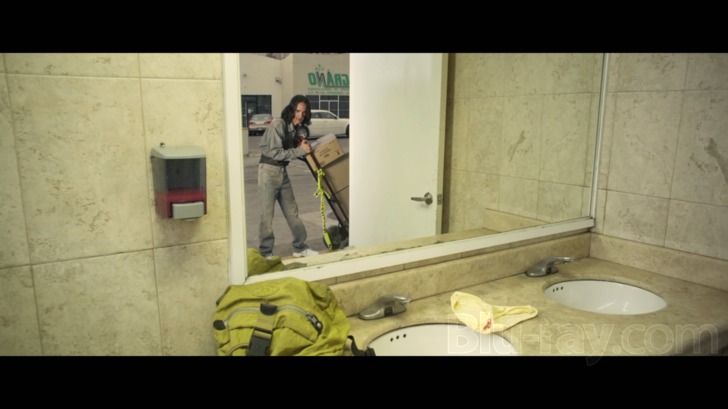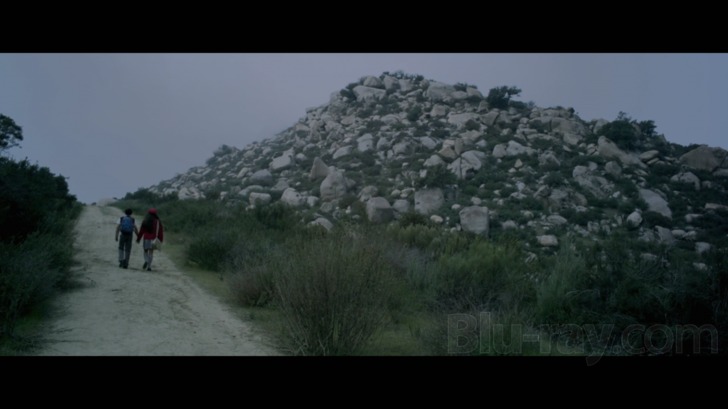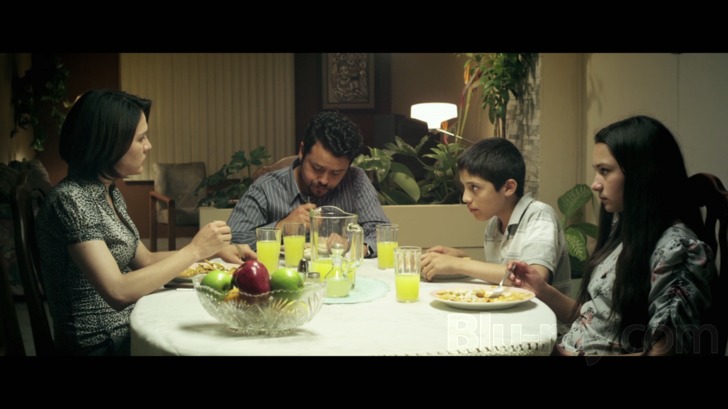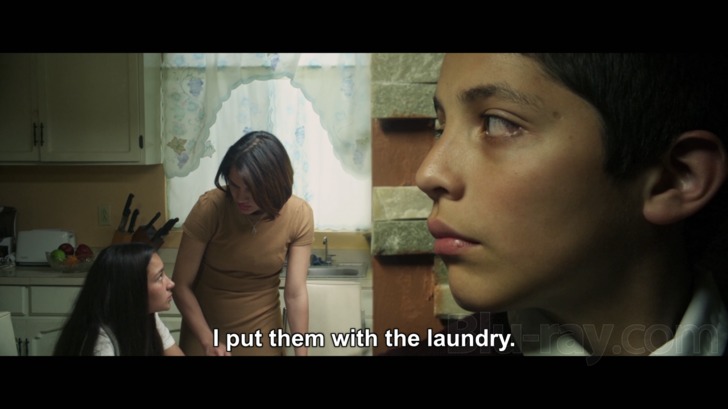Here Comes the Devil Blu-ray Movie
HomeHere Comes the Devil Blu-ray Movie 
Ahí va el diabloMagnolia Pictures | 2012 | 98 min | Not rated | Mar 18, 2014
Movie rating
6.1 | / 10 |
Blu-ray rating
| Users | 0.0 | |
| Reviewer | 4.0 | |
| Overall | 4.0 |
Overview
Here Comes the Devil (2012)
A married couple loses their children while on a family trip near caves in Tijuana. The kids eventually reappear without explanation, but it becomes clear that they are not who they were.
Starring: Francisco Barreiro, Laura Caro, Michèle Garcia, Alan Martinez, Giancarlo RuizDirector: Adrian Garcia Bogliano
| Horror | Uncertain |
| Supernatural | Uncertain |
| Psychological thriller | Uncertain |
| Thriller | Uncertain |
| Foreign | Uncertain |
Specifications
Video
Video codec: MPEG-4 AVC
Video resolution: 1080p
Aspect ratio: 2.40:1
Original aspect ratio: 2.39:1
Audio
Spanish: DTS-HD Master Audio 5.1
English: DTS-HD Master Audio 5.1 (48kHz, 16-bit)
Subtitles
English, English SDH, French
Discs
25GB Blu-ray Disc
Single disc (1 BD)
BD-Live
Playback
Region A (locked)
Review
Rating summary
| Movie | 4.0 | |
| Video | 4.0 | |
| Audio | 4.5 | |
| Extras | 3.5 | |
| Overall | 4.0 |
Here Comes the Devil Blu-ray Movie Review
Beware the Children
Reviewed by Michael Reuben March 18, 2014Spanish writer/director Adrián García Bogliano makes genre films that are long on style and short on plot. Here Comes the Devil has a simple story, but Bogliano tells it in such an elaborately roundabout way that, depending on your cinematic taste, it will either try your patience or make your skin crawl (or maybe both). Bogliano lists many films as inspiration but two are indicative of his approach: Richard Stanley's 1990 cult classic Hardware and Nicholas Roeg's stylish 1973 tale of fate and clairvoyance, Don't Look Now. As different as those films might appear on the surface, they share common elements that resurface in Bogliano's work: an unusually frank sexuality, a foreboding atmosphere so thick you can cut it with a knife and the sense of an alien presence invading everyday existence. But where Stanley lets you know who the enemy is, Roeg leaves you guessing, even at the end. So, too, does Bogliano, despite the lurid title. Maybe it's the devil. Maybe it's something else. Here Comes the Devil had its international premiere at the Toronto Film Festival in September 2012, followed immediately by its U.S. premiere at Fantastic Fest in Austin, Texas, which is co-sponsored by the Alamo Drafthouse Cinema. Other films at Fantastic Fest that year included Looper, American Mary, Antiviral and Holy Motors . Among horror films, Bogliano's film won Best Picture, Best Director and Best Screenplay. Magnet Releasing, a division of Magnolia Pictures, released it in theaters in December 2013 and is now issuing it on Blu-ray.

Bogliano has said that he enjoys films that drop the viewer in the middle of events with no explanation, as if the projectionist had skipped the first reel. He opens Here Comes the Devil with an explicit love scene between two women, Sandra and Abril (Jessica Iris and Dana Dorel). Gradually, it becomes clear that this is the first lesbian encounter for one of them. (Sexual awakening is a major theme in the film.) After the neophyte gets up to leave, the sequence takes several sharp turns. Before it comes to an end, Bogliano has shown us a distinctively rocky hill formation to which the film returns repeatedly. After this prologue, the film focuses on a family of four who spend a day's recreation in the country outside Tijuana, Mexico. Time has passed since the events of the prologue, although we don't know how much. During the course of the afternoon, the two children, Sara and Adolfo (Michele Garcia and Alan Martinez), go off on their own to explore the hills first seen in the prologue. The parents, Sol and Felix (Laura Caro and Francisco Barreiro), take advantage of the children's absence for an all-too-rare opportunity to make love. The scene has an intimacy and frankness that is intended to be unsettling, especially given events with Sara earlier in the day. (Here again, sexual awakening is an important theme.) When the children do not return, Sol and Felix are frantic. The police are called to search, and the parents check into a motel for the night, where their guilt erupts in mutual recrimination. But the next morning, Sgt. Flores (Giancarlo Ruiz) brings Sara and Adolfo to the motel in his cruiser, having found them wandering on the road with little memory of the evening. The family returns home, exhausted and relieved. But the children are not the same. They behave differently at home and at school. A psychiatrist (Michele Estrada) believes they may have experienced something traumatic, maybe even a sexual assault. The parents suspect an abduction by an eccentric local named Lucio (David Arturo Cabezud), whose van was spotted by Felix when he was searching for the children. Because the police have no solid evidence, Sol and Felix, who are desperate for some sort of closure, take matters into their own hands. Even so, Sol become increasingly convinced that other forces are at work. No loner with a pickup can explain the nightly occurrences of flickering lights, odd noises and strange visitations that continue to afflict their home. With her husband unwilling to listen to her concerns, Sol begins her own investigation and learns the local lore of the hills where the children disappeared. Eventually she explores those hills for herself. Bogliano has been criticized for his many stylistic tricks: the sudden zooms, the abrupt cuts, the deliberately bombastic and overheated soundtrack designed to keep the viewer on edge. And some of the actions taken by these supposedly ordinary middle class parents are so surprising in their extremity that they seem to come from nowhere—but then again, these are people acting under enormous strain. What Bogliano is really doing, though, is reinventing familiar material by refracting it through his own temperament and technique. In essence, his plot is a demonic variation of Invasion of the Body Snatchers, but the best filmed versions of that story created fear by showing a realistic, everyday surface that was being subverted from within. Bogliano has no interest in realism; as he says in his feature commentary, if one wants realism, then go to the bathroom. His technique as a filmmaker is to seduce the viewer into a thoroughly artificial world that is uncomfortable but irresistible (which is no doubt why scenes of explicit sex play such a key role in Here Comes the Devil). If Bogliano hasn't yet achieved the mastery of some of the filmmakers he most admires, he is well ahead of the curve—and he'll only get better.
Here Comes the Devil Blu-ray Movie, Video Quality 

Here Comes the Devil was shot with a Red camera by Bogliano's regular cinematographer, Ernesto Herrera, and finished in post-production on a digital intermediate. Magnolia Home Entertainment's 1080p, AVC-encoded Blu-ray was presumably sourced from digital files. The image is sharp, clean and detailed, except for scenes that have been deliberately softened in the original capture or on the DI (e.g., the opening love scene). The color palette runs the gamut from the subdued, darkened interior of the opening scene to the hot sandy outdoor scenes that Bogliano intended as a deliberate homage to Hardware . Black levels are appropriately set, as is the contrast that is essential to making out crucial details in certain key cave interiors. No digital processing appears to have been applied, other than what was necessary to finalize the Red footage for output to film, DCP and home video. The average bitrate of 19.99 Mbps is somewhat low for Magnolia, but Red footage compresses well. In any case, no artifacts were observed.
Here Comes the Devil Blu-ray Movie, Audio Quality 

The film's 5.1 mix is available in a choice of original Spanish or English dub, both offered in lossless DTS-HD MA. A choice of English, English SDH and English narrative subtitles is available. Bogliano confirms in his commentary that the loudness of the audio mix is intentional, and he isn't kidding. Viewers will want to consider reducing their usual listening volume by several db. It's not just the sound effects that are pumped up—banging on doors, walls and ceilings; screaming and yelling, both human and otherworldly; even a few earthquakes—but also the musical score by Julio Pillado, which has a strong heavy-metal element. The dynamic range is powerful, and the bass extension is unusually deep. If your system has a sub with any power, be prepared to feel several key moments. The surrounds are used effectively to expand the listening space for elements like passing traffic, the chirping of crickets and a few elements that can only be described as demonic.
Here Comes the Devil Blu-ray Movie, Special Features and Extras 

- Commentary with Director Adrián García Bogliano: In heavily accented English, the writer/director provides a detailed account (at times one might almost call it a "defense") of his stylistic choices, along with multiple references to his influences, including the aforementioned Hardware and Don't Look Now, other films by Nicholas Roeg, The Omen and various European horror films of lesser renown. Bogliano is somewhat less forthcoming when it comes to exploring his film's underlying themes, particularly the connections between its demonic villain and the explicit sexual content. He does point out some interesting visual and auditory parallels between the opening sequence and later events that will probably go right past most viewers (they certainly went by me), but he expressly declines to explain them. Either there's a lot more than meets the eye in Here Comes the Devil—or a lot less.
- Extended Nightmare Scene (1080p; 2.40:1; 1:32): This is a longer version of a nightmare experienced by one of the film's characters.
- Behind the Scenes Comparisons (1080p; 1.78:1; 6:26): This extra shows specific shots being filmed, with the final version, as seen in the finished film, inset in a small window.
- Rehearsals (1080i; 1.78:1; 9:34): Raw rehearsal footage of key scenes, including significant improvisation.
- Behind the Scenes Photo Gallery (1080p; various; 7:23): Approximately 100 photos, which play as a slideshow.
- AXS TV: A Look at Here Comes the Devil (1080i; 2.40:1; 2:55): This is the standard AXS TV promo. Its inclusion here is particularly valuable, because it includes the only interviews with Caro and Barreiro among the extras.
- Also from Magnolia Home Entertainment: The disc includes trailers for The Last Days on Mars, Beyond Outrage, How I Live Now and Big Bad Wolves, as well as a promo for AXS TV. These also play at startup, where they can be skipped with the chapter forward button.
- BD-Live: As of this writing, attempting to access BD-Live gave the message "Check back later for updates".
Here Comes the Devil Blu-ray Movie, Overall Score and Recommendation 

I find most horror efforts dully formulaic, which is probably why I enjoyed Bogliano's film, which benefits immeasurably from fully committed performances by Caro and Barreiro as the distraught parents struggling to contend, first, with a sense of guilt, and then with a situation that defies comprehension. But Bogliano's approach isn't for everyone; so I recommend that interested parties either rent or try Here Comes the Devil on VOD before purchasing. The Blu-ray should certainly satisfy on a technical level, and the extras are worthwhile.
Similar titles
Similar titles you might also like

American Mary
2012

Bad Milo!
2013

Father's Day
2011

Bite
2015

Cabin Fever: Patient Zero
2014

Rabid
2019

Antibirth
2016

Mandy
2018

Open Windows
2014

Wolf Creek 2
Uncut
2013

Halloween 4K
2018

All Cheerleaders Die
2013

Trauma
2017

Scarecrows
1988

The Ruins
Unrated Edition
2008

The Strange Color of Your Body's Tears
L'étrange couleur des larmes de ton corps
2013

The ABCs of Death 2
2014

The Loved Ones
2009

I Spit on Your Grave 4K
Day of the Woman
1978

Tales of Halloween
2015
